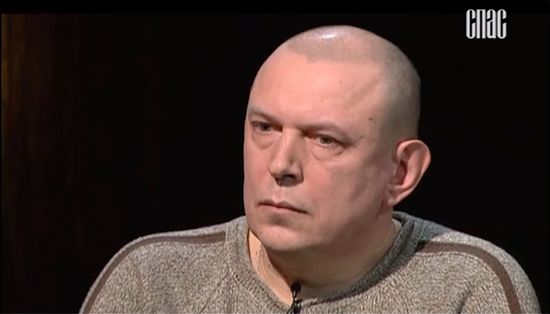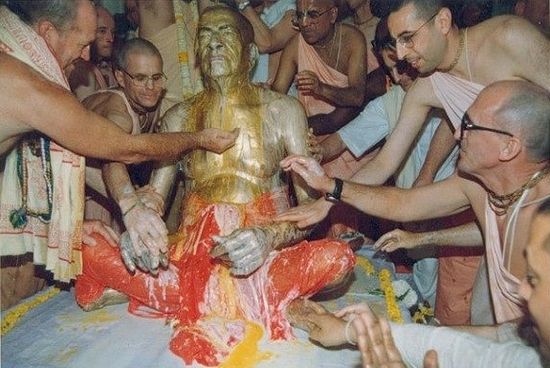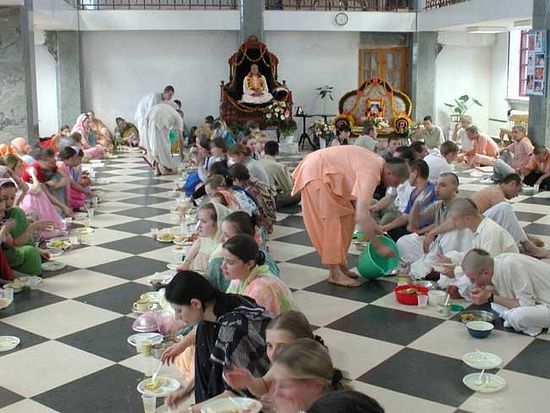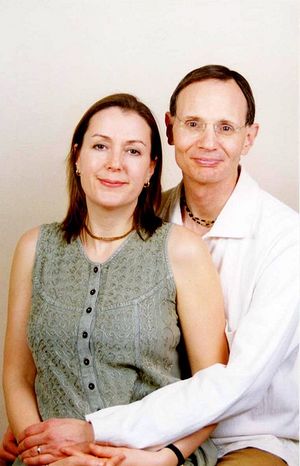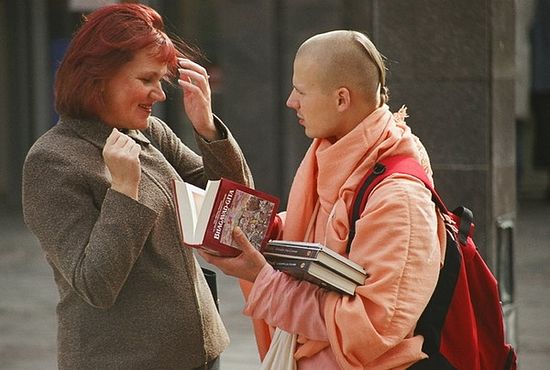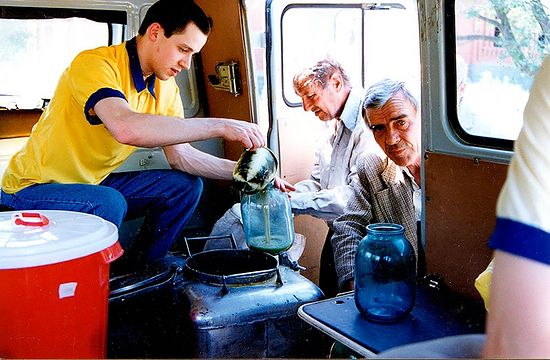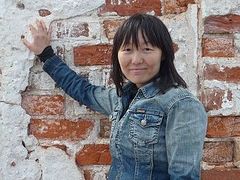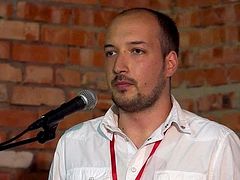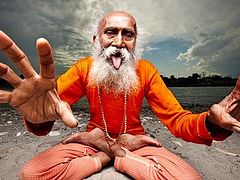More than a year ago, Spas TV channel introduced a new missionary program, “My Path To God”. The host of the program, Priest George Maximov, interviews people who converted to Orthodoxy from various non-Orthodox denominations and confessions. Today we present to our readers an English translation of Father George’s interview with former Krishnaite Andrei Kolobov.
Father George Maximov: Hello. You are watching My Path To God, a program about people whose path to Orthodoxy was challenging and who had to re-consider their ways for the sake of this conversion. Today our guest is Andrei Alexandrovich Kolobov. For a long time he was very closely involved with the International Society for Krishna Consciousness (ISKCON). Many of you met the representatives of this movement. They often call themselves Vaishnavas, but in our country the term Krishnaites is more common. Andrei Alexandrovich, please tell us how you got involved with this organization.
Andrei Kolobov: I joined them just like everybody does. I met people from this organization, started reading their books and attending their meetings regularly. So gradually, I became a member.
Father George: Did you consider yourself Christian at that time or were you simply searching for the truth?
Andrei Kolobov: I was on an active spiritual quest then, and had absolutely no experience of church life.
Father George: What was it that attracted you to ISKCON? Their teachings or organization? Communication? Maybe somebody’s personal example?
Andrei Kolobov: It is difficult to single something out, as it was all of the above. I can’t say that the teaching was very appealing. It is fairly confusing, non-systemic and self-contradictory. Just like Hinduism in general. But as an inquisitive person, I got interested and thought I should pay some attention to it. That is how my gradual submersion into these teachings began.
Father George: You spent a fairly large part of your life in that organization…
Andrei Kolobov: About 13 years, if you count from the moment I first learned about the movement to the moment when I abruptly quit it.
Father George: This is a lot. You probably made friends and built your social circle during that period?
Andrei Kolobov: Yes, my social circle almost entirely consisted of Vaishnavas, as you correctly called them using their internal terminology.
Father George: Were there any initiations?
Andrei Kolobov: Yes, I was initiated.
Father George: I can imagine that a person whose life was connected to that movement for a long time and who had his entire social circle there must have a very serious reason to quit. What was that reason for you? Did you start doubting the teachings or the organization? Or was it something else?
Andrei Kolobov: I was always doubtful about the teachings. As I mentioned earlier, they are contradictory and inconsistent. I asked the senior devotees[1] who, according to their rank, must answer or at least try to answer my questions. But during my involvement with that movement I never got any answers. They either said something vague or laughed it off. There were some reasonable answers, of course, but the main questions remained unanswered.
Father George: Which ones, for example?
Andrei Kolobov: Firstly, the books by Bhaktivedanta Swami that the teaching is based on are self-contradictory. This is the first thing that catches the eye of a person who received a secular education and has a consistent worldview. It is difficult to destroy this worldview as our school forms it fairly clearly and consistently. But that is what the Society for Krishna Consciousness does. You can say it is destructive in that respect. It gradually destroys your worldview and when your worldview is fragmented, they fill your mind with a multitude of myths, so you live as if in a fairy tale, in some kind of delusion. These fairy tales are inconsistent and their plots are always contradictory. You have to give up, stop noticing these inconsistencies and learn to live with them. Otherwise, you cannot become a Krishnaite and you are treated like disposable material. Those who cannot be broken leave the organization.
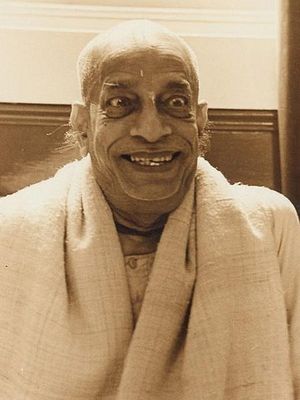 Sri Srimad A.C. Bhaktivedanta Swami Prabhupada, founder of the International Society for Krishna Consciousness
Sri Srimad A.C. Bhaktivedanta Swami Prabhupada, founder of the International Society for Krishna Consciousness Besides, there are many inaccuracies. Prabhupada fabricated a story about new “ancient wise men” that never existed. He also put his own words in the mouth of famous authors who really did exist. He referenced various works saying that this is where it was said. Ok, but what if you take the time and find that reference? You find that book and read it, but those words and even thoughts aren’t there. So, where did he quote them from? In India exact quoting is generally uncommon. It is part of the culture. Over there, people fully rely on the person’s authority. If he is a recognized wise man, everybody worships him anyway. So if he says “It was said in Purana” or “According to Upanishads this mantra is redeeming,” nobody checks if it is true. Even if you’re in a big meeting of your peers, they just say, “It is said so there”. And that’s it. Nobody checks the quote. It is part of the culture. Here this doesn’t work and if it does, it is not easy, because if you say, “It is said so”, you have to prove it, which is quite easy to do as the texts are available. This is indeed their big problem. I think I would have quit this delusion earlier, if at that time more texts and studies were available. I really missed having serious literature. While in this sect, I was ready to read, as I was open to their ideas. But there was very little I could find. Later I dug myself in scientific literature, but this was research, not simply reading. There was no reader-friendly literature about this after the breakup of the Soviet Union. That is why we were defenseless against this massive attack.
This was promoted aggressively, not in terms of attitude, but in terms of quantity. That is, you are simply overwhelmed by a huge amount of information, including a mass of legends and statements like “Look, this temple is 2.5 million years old…” How can you check, refute or confirm that? It can’t be done. So most people think “Ok, it is probably so.” Imagine yourself as such a person, you would probably think: “There are three hundred knowledgeable people in this hall, should I be the only one to stand up and object? I’m not an India scholar, I’ve never been to India… So, maybe it is true, let’s assume that this is correct.” In the end, your mind is so full of these assumptions that this quantity transforms into quality. You become lost and simply try to follow at least some train of thought, without losing your mind in the process. In general, it seems interesting, so you feel you need to learn that. This is how it happens.
Father George: What did they say about Christianity? They can’t hush up the fact that Russia is a country with Christian culture and people that come to them have more or less a Christian upbringing.
Andrei Kolobov: Of course, they can’t avoid it. They don’t really hide their derogatory attitude. They say that “Christianity is a secondary religion. It is not at all ancient and is considerably younger than Krishnaism. Basically, they say that Jesus came for people who were desperate. He is just one of the teachers, one of possible ways for those who cannot reach the higher level. God is merciful, though, so for those freaks who can’t even refrain from eating meat, there is such a concession in the form of Jesus’s teaching.” This attitude is not even concealed, they speak of it openly at their meetings. It is even recorded and available on YouTube.
Father George: You said that during all this time you had some things you didn’t understand in the teaching. However quite a few years passed before you decided to quit the organization. What motivated you to do so?
Andrei Kolobov: Yes, there was a motivation. A great personal tragedy happened and it shook me. I must note that people are leaving ISKCON[2] all the time. At least this used to be the case. I don’t know the current situation, but it is unlikely that anything drastically changed since I left. When I left, this was very common. Many people joined, but many people quit too. All their teachers talked about this during the meetings. They said that this was their problem and that we needed to do something to stop people from leaving. I have my social circle and I saw how people changed. Many of them changed in a frightening way. All of a sudden, people developed the qualities that are not only considered sins in Krishnaism, but are disgusting from a general point of view. And when your close acquaintance, your friend, somebody you prepared feasts with, suddenly does this…
Father George: What feasts do you mean?
Andrei Kolobov: Krishnaism has a kind of food cult, and joint eating of consecrated food is very important. In the Western world, this all started with Prabhupada. A very intimate atmosphere is created at such a feast. You feel closeness to people you cook with, consecrate all that food in a ritual and then, as Krishnaists call it, “partake” of it; i.e., in plain words, simply eat it. You feel very festive and joyful at that moment and get close to people. That is how the friendship starts usually, at the table or rather “on the floor” because all of this happens on the floor. The plates are placed on the floor. In India they just use some sort of leaves, but we used disposable plastic plates. People just walk between the rows and put food on them.
So, coming back to my quitting. I was among the cohorts of pupils of Harikesa Swami. All current leaders of Russian Krishnaism are his former pupils. He quit ISKCON, resigned from the sannyasin[3] status and got married. This story was quite popular in 1998. This was a serious shock for me. God did not simply lead me away from them—He actually pushed me away. Then one Krishnaite who was very close to me died. That was when I was really… overwhelmed. I started seriously thinking about what was happening. Where am I? What is happening to me? How did I get here? And during that time—I think it is important to emphasise—someone was praying for me. I know who it was. I know how long that person has been praying. I know how tearful that prayer was. As a result, I started seeing things more clearly. I lived in Moscow at that time and still went to Krishnaist temple on Begovaya street. Once I was taken to Sretensky monastery where I bought a cross. I still wear it. Many year later, I was baptized with that cross. But at that time, when I first wore it, I realized that I am not going to take if off. That is how it started. About that time I also got my prayer beads…
Father George: Krishnaist prayer beads?
Andrei Kolobov: Yes. Using prayer beads is not a simple thing, it is very serious. As required, I used the prayer beads when I was chanting 16 rounds every day. 25 rounds on Ekadasi.[4] I followed the rules and did everything that was necessary… Krishnaists know what I mean. I didn’t stop my communications with people—it is a very important issue in Krishnaism—you can’t isolate yourself. They always emphasize that if you are alone, if you are away from the community and you are not communicating with Vaishnavas, you will burn out very soon. So, once I took the prayer beads and suddenly realized that I will never chant those rounds again. I didn’t throw the beads out. Just placed them carefully and respectfully on the table. My wife threw them away few days later. I also removed mala from my neck at that time (the prayer beads and mala are made from a wood that is sacred for Hindus). I understood that I will never chant japa[5] again. It’s not like I gave myself a word not to do it, I just had this inner understanding. I felt I didn’t need chanting any more. I once counted how many of those “sacred words” I recited while I was a Krishnaite. I don’t remember the exact number now, but it was more than a million for sure. They all simply turned to dust, like an idol. You know, like the miracles you read about in the lives of saints, the idol just turned to dust. Imagine this, I was there for so many years, chanted, meditated, devoted my time to it. I brought in many people, distributed books, preached and delivered lectures. This was important for me, this was a huge part of my life, this was the song of my heart… And suddenly all this is turned to dust by a lightest breeze. I just touched it with my finger, and it all collapsed.
Father George: But you didn’t come to Christianity right away?
Andrei Kolobov: No. I wore the cross and felt inside that this was mine. I thought I’d just wear it and that would be it. No obligations. So what if I felt something… I also took prayer beads some time ago and was wearing mala, so I was more realistic about it. However, I understood: I want to wear that cross. I need it. I can’t be without it. We’ll see what will happen next. Then there was another memorable moment. I was taken to Kolomenskoye. There is a river bend, a very beautiful church with tent-shaped architecture from the times of Ivan the Terrible. I got out of the car, saw that snow white church, the sun on a summer day… There was a guy with semantron, he just stood there and played it. And I heard the music of Russian spirituality, as I understood it at that time. This was how Rus’ sounded. This was something that my ancestors listened to. I stood and listened, and then suddenly I was overwhelmed. This was not sentimentality that is so popular with Krishnaists. I practically experienced catharsis. I suddenly saw Rus’. I lived in Russia for so many years, yet I saw nothing Russian. It’s not that it wasn’t there—I simply didn’t see it. And here it suddenly came to me. This was my second step, and it gave me the air I could breathe. I suddenly realized that I was in a Christian world. Then came the books. A lot of books. I like to read, I read a lot even when I was a Krishnaite. So a simple thought came to me: Why don’t I read some Christian literature?
I should emphasize a very important aspect: I was very skeptical about Christianity. I tried to test it, find faults with it. I remembered how Krishnaism collapsed for me, simply turned to dust. I really didn’t like that experience. When you’ve been building your spirituality and trying to reach God for 13 years and then discover that not only didn’t you move from your starting point, but got you buried up to your head in the sand, in some kind of desert… You feel very uncomfortable. This experience made me try to attack Christianity. I tried to crush it. I had aggressive arguments with all the Christians that talked to me. I tried to find faults with them. I tried to find faults with the Bible. I tried to find contradictions there as well. But Christianity was solid as a rock; I couldn’t even chip off a little piece.
And all those Krishnaite lies about Christianity turned out to be baseless. During those years, I didn’t know anything about Orthodoxy. Our teachers told us: “Well, they are some kind of meat-eaters… Jesus was a good guy, but they murdered Him... He was their teacher, their guru, and what did they do? We here honor our gurus. He came to those barbaric ancient Jews and they killed their guru. What can you expect from this culture? There is nothing to talk about.” That was it; Krishnaites do not go any further in their views on Christianity. The same thing is happening today. Krishnaites mostly try to influence young people. What can a young person understand there? A few days ago I talked to one such person. A young guy, 20 years old, a student. His mind is completely blank and he doesn’t hear what you say. He is overexcited and filled with all that information… 5000 years, culture, Bhagavad-Gita, etc. I told him: “Let’s just think about it, there is more information that you can read”. It is very difficult to talk to such people.
Father George: Did your old friends try to talk to you to get you back?
Andrei Kolobov: I quit very abruptly, so no such attempts were made.
Father George: Just recently, I learned that at some skating rink in the northern Moscow Krishnaites opened an outlet where they give away free food and tell people that they are Vaishnavas, that they have this culture, etc… I understand this is their missionary activity. With Krishnaites, it frequently involves giving away free food. Why is that? Why is it so important for them to share their food with strangers?
Andrei Kolobov: There are both religious and social aspects. From a religious point of view, according to their internal mythology, the consecrated food is Krishna himself. That is, from Christian point of view, this food represents things sacrificed unto idols. From Krishnaites’ point of view, this food is consecrated and the person who eats it comes into contact with a deity and is thus blessed. This is a magical form of preaching. When somebody eats that food, Krishnaites watch that person with anticipation, thinking: ”Well, did you understand? Do you get how great He is?” From a social standpoint, this is a method of creating a positive image in the society. They say, we’re feeding the hungry, what can be wrong with that? This is good from all points of view. When there is any conflict, a war, people shoot at each other, children and elderly suffer as they are obviously the most vulnerable, immediately these easy-going guys show up and start giving away free food. It is risky, so they come off as heroes. The bullets are flying, for example in Chechnya, and we are cooking rice and offering it on the altar for the hungry. Well, we don’t have to tell people about the altar, otherwise they might refuse to accept the food. In general, from the society’s point of view, it is a good deed. All of this is very carefully documented by Krishnaites. Official thank-you letters are collected, for example from the head of administration of some district or city. Later these letters are used to promote the organization. This is a very well thought out policy that allows them to get their foot in the door and create a positive image of the organization. Krishnaites don’t have many things like that. Their other actions just irritate people. So they have two strong arguments like that. First: We are feeding the hungry and you treat us badly. And we have a thank-you letter from this official and from the other important person… even signed by so-and-so himself… How can you argue with us? Second: We were persecuted during the Soviet times. It is true, several people died in prisons during the Soviet times. They were deliberately humiliated and given only meat because their jailers knew that they were Vaishnavas and were not supposed to eat meat. This did happen. Several people were indeed imprisoned. But not more than that. However, Krishnaites always show it off and, to a certain extent, it works. Martyrdom always evokes a good response in peoples’ hearts.
Father George: In the Soviet Union every religion was persecuted, even shamans from Siberia were arrested and imprisoned in 1930-ies. So, one can say that persecution was a general policy and doesn’t prove the validity of any religion. Although it may demonstrate the degree of people’s commitment to their beliefs.
Andrei Kolobov: This shows the perseverance of people, nothing more. Deluded people are sometimes very steadfast.
Father George: Is there something that people converting from Krishnaism to Orthodoxy should pay a special attention to when they start leading a churched-based life? The systems are very different. Perhaps, many things in Orthodoxy seem very strange to such people?
Andrei Kolobov: I don’t think so. We live in Russia and know Russian culture from childhood. These Hindu teachings are brought from the outside and are very artificial—all those karmas, reincarnations… Even if we don’t know Christianity in depth, inside we still unconsciously agree with Christ, with many of His commandments and teachings. It is in our blood, in our air. Krishnaites actively use that, and in originally Christian countries Krishnaism has a very distinct Christian character.
Father George: This is an attempt to blend in, to make missionary work easier.
Andrei Kolobov: Yes, they include things that are not and cannot be present in classic Vaishnavism. It inevitably becomes apparent in the western adapted neo-Krishnaism. This really upset me when I got to understand both systems to a certain extent. Something that doesn’t even have any roots in Krishnaism is suddenly presented as originally Krishnaite. Krishnaism itself is fairly ancient in the Hindu culture, but this Hindu Krishnaism is different from what is described by western Krishnaites.
Father George: Thank you very much for your story, Andrei Alexandrovich. I hope to God that many of those who are far from Christ but have the love for the Truth in their hearts would find the strength and courage to come to Christ and find the consolation, peace and solid support that you found.

